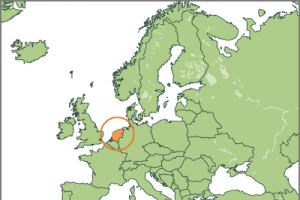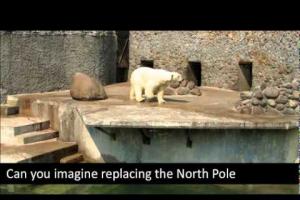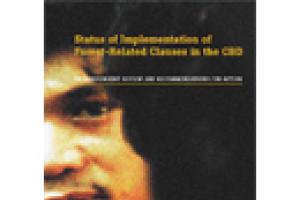The Netherlands
Bulletin articles
23 April 2007
Eindhoven Airport in the Netherlands has claimed to be the first airport in Europe where passengers as of May 2007 can compensate emissions from their flight by donating for tree plantation projects. Last week however, activist groups in London have criticized this kind of carbon offsetting. So how credible is carbon compensation?
Bulletin articles
7 March 2006
Earlier this year, a rare thing happened: West Papua hit the headlines. The news was the discovery of a new species of honeyeater bird, a "lost" bird of paradise, a nearly extinct tree kangaroo, 20 new species of frogs, four new butterflies and five new species of palms. The species were found during an expedition to the Foja Mountains organised by Conservation International and the Indonesian Institute of Sciences. "It's as close to the Garden of Eden as you're going to find on Earth," said Bruce Beehler, co-leader of the group.
Other information
18 March 2002
Commissioned by the Global Forest Coalition
This report is based on 21 country case studies, including Australia, Brazil, Cameroon, Canada, Chile, Colombia, Czech republic, Ghana, India, Indonesia, Kenya,Malaysia, the Netherlands, New Zealand/Aotearoa, Papua New Guinea, Russia, South Africa, Suriname, Uganda, United Kingdom, and Uruguay
Bulletin articles
16 October 2000
The sixth Conference of the Parties of the Convention on Climate Change will take place in November in The Hague, The Netherlands. The public at large, increasingly concerned over the present and future effects of climate change, may well expect as a matter of course that their governments will have the good sense to take constructive action to solve the problem. Among those of us who have been participating in this international process, however, expectations are somewhat different.
Bulletin articles
16 October 2000
With just five weeks to go before climate negotiators flock to The Hague to hammer out the implementing rules of the Kyoto Protocol, forests are more and more in danger of being reduced to a single commodity --carbon-- to be traded away under the Kyoto Protocol's so called "Flexible Mechanisms".
The resulting "Kyoto forests" are likely to be tree plantations --supposedly a substitute for reducing carbon emissions-- and the implications of these for forests, forest peoples, biodiversity and sustainable development could be grave.
Bulletin articles
17 August 2000
The Conference of the Parties of the Framework Convention on Climate Change -preceeded by a meeting of its Subsidiary Bodies in September in Lyon- will take place in The Hague in November. The obscure language used in the climate talks -and the even more obscure objectives of many governments and businesses- make it necessary to translate what's being negotiated into understandable concepts in order to facilitate very much needed public participation in the debate.
Other information
20 January 2000
The social and environmental impacts of tree monocultures in the Andean Páramos of Ecuador in a project carried out by the Dutch consortium FACE are analyzed in a thesis work for a PhD in Environmental Sciences of the Universitat Autónoma de Barcelona, Spain. The author -Verónica Vidal- worked during several months in that grasslands region of Ecuador, inhabited by indigenous peasants, and which is capital for the maintenance of the hydrological cycle and as well as hosting high levels of biodiversity.



